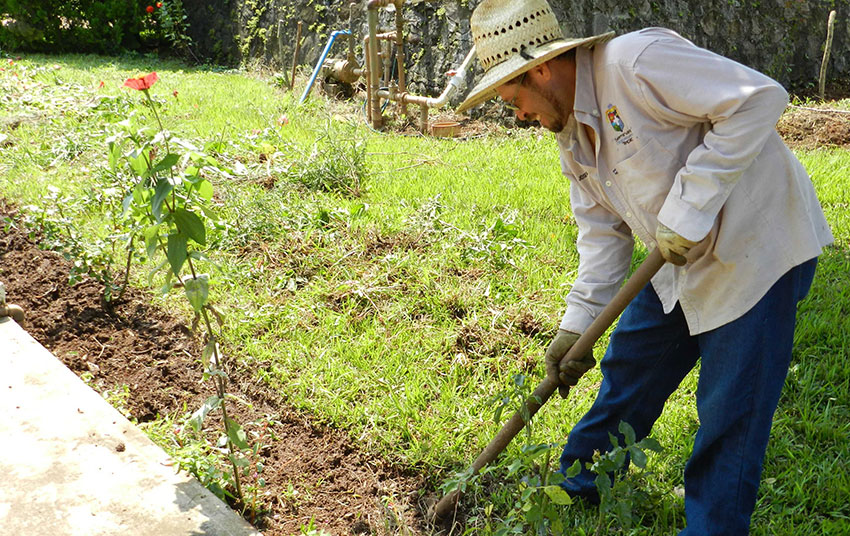While the coronavirus pandemic sweeps the world, changing life as we knew it into something unknown and unimagined, expats in Mexico have a unique set of problems to deal with on top of what people everywhere have on their plates.
In this time of social distancing and stay-at-home orders, we’re reconsidering what’s safe and socially responsible — both for us and the housekeepers, gardeners, pool cleaners, nannies, Spanish teachers and dog walkers that have been an integral part of our regular lives.
In other countries, this problem is playing out, too, and a recent New York Times article examined the plight of domestic workers in the midst of that city’s coronavirus crisis.
Hundreds of people responded to my posts on a dozen expat Facebook pages all over Mexico and their stories made one thing very clear: workers are more than just “the help;” you’re paying them for not being there and are more than happy to do so.
Jay, a Canadian resident of Mexico City for 19 years, asked his cleaning lady to stay home in mid-March and continues to pay her salary, plus IMSS contributions for health care. He chose a different plan with his dog walker, opting for limited exposure in order to help out a longtime employee.

“Our dog walker continues to come,” wrote Jay. “We used to send our dog out with him twice a week but increased it to five days a week to help him out as his business declined.”
In San Miguel de Allende, Angie said she feels OK about her gardener continuing to come, as they don’t have to interact with him at all. They’ve arranged to pay him using a transfer to his bank account (via Transferwise). Others agreed that outdoor workers could still safely do their jobs, as long as they didn’t have to use public transportation.
“We’re fortunate with our gardener — he lives just down the street from us,” said a longtime Oaxaca resident. “I told him that he can continue to look after the pool and garden but I will water any plants within our living space.”
Susan, another San Miguel resident, said most other local expats had made the decision in mid-March to pay their workers to stay home.
“Our decision was late, following the federal government’s mandate in early April,” she wrote. “Our plan is to pay our housekeeper and gardener/pool person for the full month of April and longer if necessary, to stay home.”
Fellow SMA resident Carol agreed, saying, “I’m prepared to pay them for the duration of this outbreak. That could be 12-18 months!”
“We’ve asked our housekeeper to stay home, and we’re paying her,” added Angie. “As far as I’m concerned, paying her is an expense we planned on anyway, and it won’t break us to pay her — but it might break her family to go without income.”
From Mexico City, Alicia put it simply. “All on fully paid leave, for as long as it takes.”
The toll of self-quarantine is about more than money, though, and life without the household help we’ve come to depend on can be challenging in other ways. Shannon and her husband have operated a small B&B in Oaxaca’s Bahías de Huatulco since 2001. They employ a gardener three days a week, one full-time maid and another for Sundays.
“After living in Mexico with a maid to do everything for me over the past 20 years, this is going to be an adjustment,” wrote Shannon. “Making my own bed, sweeping and washing the floors, doing dishes and laundry. I’m not complaining, just admitting that I’ve had a very easy life and this will be an adjustment. Without guests and unable to go out, I’ll certainly have time!”
“When I’m finished my chores, I have a lovely home with a magnificent ocean view. I have a computer with movies, I have books and I have my golden retriever and my husband for company. I can swim in my own pool.”
“But what about my maid? She has no TV or computer. She has a cell phone but no internet connection in her tiny home,” Shannon mused. “She doesn’t read, has a 10-year-old son, but no husband. Her village is being patrolled, and no one is allowed on the streets. It’s forbidden to visit family and this is a culture based on social contact. How will she pass the long, long days of solitude over the next several weeks?”

As towns all across Mexico have shut down, in effect becoming ghost towns, many expat residents are worried about their workers, who have become like family over the years.
“Paying my housekeeper of 17 years to stay home and safe,” wrote Jan. “Even helping with a bit extra too. Times are hard and I love her and her family!”
“We all need to take care of each other,” echoed Laura from SMA. “I’ve paid my housekeeper to stay home for two months. She’s been with us five days a week for 13 years!”
While some pointed out that legally household workers must be paid during this time, what seemed to motivate people who responded was that “it seems like the right thing to do.”
“I’m paying my wonderful housekeeper to stay home indefinitely,” wrote Peggy. “It’s not just to protect me; I don’t want her riding the bus and returning to her four-generation family, possibly infecting them. I am not rich but she would be devastated without the income.”
“I’ll pay the woman who cleans for me not to come for as long as it takes. It’s already in my budget and I want us all to come through this OK, if possible,” added Terrie.
In Ajijic, Shelley paid her housekeeper and gardener not to come and expects that to go on for several months.
“How did Maria Elena do it?! I’ve been doing eight-hour days for two weeks now just to get a handle on the garden and housework,” she wrote. “I always said I could never live here without her, and now I’m seeing just how much less the quality of my life is without her.”
After seeing how much work her housekeeper actually did, Shelley has decided to increase her wages.
“I can’t wait for Maria Elena’s return!” she wailed. “I can’t tell you how much I value her. She is absolutely irreplaceable.”
Mexico News Daily
